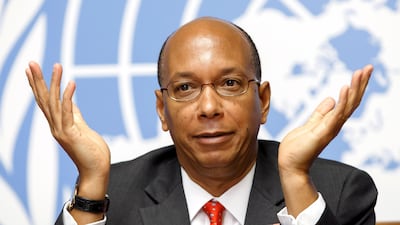A new round of sanctions against North Korea needs to be given time to work with the diplomatic options running out to rein in the rogue regime, the US disarmament ambassador Robert Wood has told the National.
The failure of the multinational effort to prevent Kim Jong-un from expanding his nuclear ambitions prompted Donald Trump on Tuesday to warn that the US would “totally destroy” North Korea if the country threatened the US or its allies.
The UN agreed a new round of sanctions against North Korea last week with China and Russia under pressure to do more to persuade the regime to halt a series of missile tests. North Korea says they are aimed at building sufficient military strength to deter the US from launching an attack.
“We need to give the sanctions a bit of time,” said the ambassador. “We don’t have a lot of great options, diplomatic options, left.
“We are going to continue to push for full and effective implementation of these sanctions. We believe if we do get that, the regime will have to start to change course.”
Mr Wood insisted that China has been “very helpful” and has moved closer to the US position while working on the sanctions regime at the UN. “Could they have been better? Of course,” he said.
“We have to continue to push and convince China there is no other way forward now other than laying down very onerous sanctions on this regime,” said Mr Wood, speaking before Mr Trump’s UN speech. “It’s the only language this regime will understand.”
______________
Read more:
Trump stresses need for resolving Qatar row to 'counter Iran threat'
______________
The UK’s Foreign Secretary, Boris Johnson, said that China was vital to putting pressure on Kim Jong-un following the “harshest UN sanctions placed on any nation in the 21st century”.
After meeting with his Chinese counterpart Wang Yi in New York, Mr Johnson said that China “controls more than 90 per cent of North Korea’s external trade, including its oil supplies, making them perfectly placed to put the kind of pressure on Kim Jong-un that will make him take notice”.
Ambassador Wood was speaking from Geneva before countries started signing the first treaty to ban nuclear weapons, an attempt at a stronger framework to prevent the global arms build-up than has been achieved by the 50-year-old Nuclear Non-Proliferation Treaty.
The new treaty requires that ratifying countries never develop, test, produce or stockpile nuclear weapons. More than 50 countries are expected to sign on Wednesday. Pro-treaty campaigners said that growing tensions between the US and North Korea showed the need for the treaty.
“This treaty is an important milestone towards the universally held goal of a world free of nuclear weapons” at a time of increasing concern about their risk, U.N. Secretary-General Antonio Guterres said as he opened a signing ceremony.
The treaty was backed by 122 countries in July but all nuclear-armed nations and their allies have boycotted it, saying that it risked undermining current efforts at deal-making and compromise. The French Foreign Minister, Jean-Yves Le Drian, said on Monday that the treaty was “wishful thinking” that is “close to irresponsible”.
“It will not reduce nuclear weapons stockpiles by one single weapon,” said Mr Wood, claiming that it would worsen already stark differences between nations.
“Whether it will trigger a movement for a weapons ban, I doubt it. I just don’t see that happening. I view it as nothing more than a political statement… about their unhappiness at the pace of nuclear disarmament.
“I see no positives at all coming out of this treaty coming into force.”

